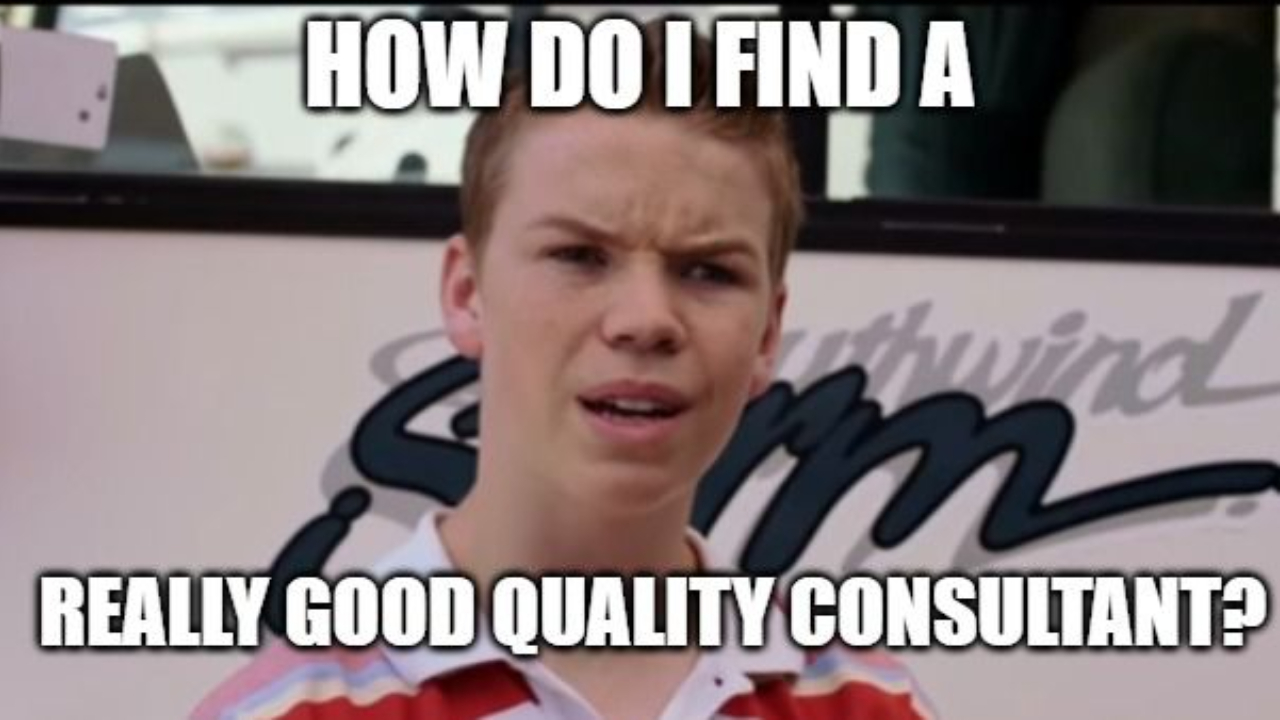Really, how?

After working in the field of quality management for decades, I’ve learned a lot. I’m humble enough to say I fell into the field accidentally and then painfully failed my way to success through a lot of trial and error. And learned some really hard lessons.
But, now I know a lot more than I did when I started. And now that I’m a consultant, I am hired by a lot of companies to undo what a previous consultant has done for (to) them. Before you hire a quality consultant, here are some pro tips:
• Don’t google “quality consultants” to find one. Reach out to your network and get a referral. Get a firsthand opinion from someone who has actually worked with someone they were successful with. Find out exactly what they worked on together and ask about the outcomes. Did they achieve success? Did they enjoy the process? Did they view it as adding value to their business?
• If you’re pursuing certification to a standard like ISO9001, if a consultant promises to “get you certified” in a quick hurry and/or provides “a full suite of simple templates” claiming to create a quality management system for you, don’t hire them. You’ll be hiring me later, because you might well get that certificate, but your system will not be robust enough to last. It will slowly morph into something unmanageable and not of any use to anyone, except maybe an auditor at your next surveillance audit.
• If a consultant does not immediately advise you (and constantly remind you) NOT TO GO CRAZY WITH DOCUMENTATION, don’t hire them. The people in your company will reject the quality system you create, because they can’t manage/don’t need/don’t use and don’t want that mess. Documentation is important, whether it's for the purpose of obtaining a quality certification, or just establishing the rules of operation within your organization, documentation must be clear, concise and easy to access and navigate.
• If you’re pursuing certification to a standard like ISO9001, if the consultant does not explain that they’ll start by capturing what you’re already doing as your normal course of business and advise you that there is VERY LITTLE additional content that will be needed to be added, don’t hire them. A good consultant can identify all the ways that your business already complies with ISO 9001 through your regular activities. They can capture it and help you construct a SIMPLE and easy to maintain quality management system that your company and your entire business can actually use, maintain and leverage to IMPROVE your business.
• If a consultant cannot provide you with a very detailed timeline and list of ACTION ITEMS required to help you create your quality management system or whatever project you’re undertaking, don’t hire them. A good consultant will help you understand exactly what is required and what input will be needed from everyone on your team. A consultant cannot create a good quality system FOR you in a vacuum. Your team’s engagement is critical from day one. Getting buy-in later doesn’t work.
Getting help and hiring outside expertise is the smart move when an organization does not have the internal resources needed. But, it’s important to choose the right person with the right experience to ensure you get your money’s worth.
A good consultant will have a broad and diverse background that goes beyond expertise in International Quality Standards like ISO 9001 and quality management overall. They will have learned about compliance, but also understand how business works and why it is difficult to get everyone plugged in to a quality management system. They will have experience in a number of disciplines beyond just quality so that they understand how all the processes within a business interact and contribute to the business. They will understand how to minimize effort on everyone’s part to maintain compliance while actually improving the bottom line through better quality.
A good consultant can see the quality system through the lens of everyone on the team and understand how the burden of contributing is perceived. And they can identify the real benefits that can be realized by getting everyone engaged. They understand that getting a certification is an important benefit. But, getting a certification using a robust and effective quality system that actually WORKS for the business is the real goal. The certification is just a bonus when it’s done right.
A good consultant will provide you with guiderails to keep you on track and focused. They will step in when you are drifting off course. They will be able to recognize the warning signs of a quality management system that is becoming too complex to maintain or losing its engagement within the organization. And they will know ways to quickly correct.
If your organization needs support developing a new quality management system, rebooting an old one, help with internal audits, or wants to use your quality management system and/or lean and Six Sigma to improve your processes, reach out and let’s talk about it.


